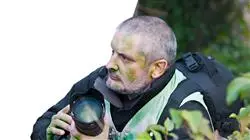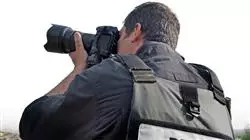University certificate
Scientific endorser
.png)
The world's largest faculty of journalism and communication”
Introduction to the Program
This program will allow you to learn about the latest advances in photographic technique and its application in Photojournalism, delving into issues such as editing with Photoshop or image rights"

The new avenues opened up by digitalization have brought about a revolution in the world of journalism. However, there are more traditional elements that maintain a great weight in this discipline. Photography has been an essential component of communication for decades, and its importance has continued to grow in contemporary journalism. However, the photographer must aspire to adapt to the current communicative context, which demands professionals with a large number of tools to develop comfortably in the digital environment.
Thus, this Advanced master’s degree in Photojournalism offers the photographer the opportunity to delve into the latest developments in this area, paying attention to photographic technique, editing and post-editing with software such as Photoshop, Bridge or Lightroom image rights or even the use of drones for aerial photography. With all this knowledge, the professional will be ready to face the present and future challenges of this field.
All this, from a 100% online teaching methodology that will allow you to combine your work with your studies, since it will be completely adapted to your personal circumstances. In addition, you will have at your disposal numerous multimedia resources that can be accessed 24 hours a day from any device with an internet connection, and you will receive the support of the best teaching staff, composed of active specialists in the field of Photojournalism.
You will be able to catch up on the latest developments in digital photography from a 100% online methodology specially designed to allow students to combine their professional life with their studies"
This Advanced master’s degree in Photojournalism contains the most complete and up-to-date program on the market. The most important features include:
- The development of case studies presented by Photojournalism experts
- The graphic, schematic, and eminently practical contents with which they are created, provide scientific and practical information on the disciplines that are essential for professional practice
- Practical exercises where self-assessment can be used to improve learning
- A special emphasis on innovative methodologies in photography
- Theoretical lessons, questions to the expert, debate forums on controversial topics, and individual reflection assignments
- Content that is accessible from any fixed or portable device with an Internet connection
With this program you will learn the principles of photographic documentation, one of the fastest growing areas of Photojournalism today"
Its teaching staff includes professionals from the field of journalism, who bring to this program the experience of their work, as well as renowned specialists from reference societies and prestigious universities.
The multimedia content, developed with the latest educational technology, will provide the professional with situated and contextual learning, i.e., a simulated environment that will provide an immersive training experience designed to train for real-life situations.
This program is designed around Problem-Based Learning, whereby the student must try to solve the different professional practice situations that arise during the academic year. For this purpose, the professional will be assisted by an innovative interactive video system created by renowned and experienced experts.
A teaching staff made up of professionals in the fields of photography and journalism will accompany you throughout the educational itinerary"

TECH will give you 24-hour access to all of the program's learning resources"
Why study at TECH?
TECH is the world’s largest online university. With an impressive catalog of more than 14,000 university programs available in 11 languages, it is positioned as a leader in employability, with a 99% job placement rate. In addition, it relies on an enormous faculty of more than 6,000 professors of the highest international renown.

Study at the world's largest online university and guarantee your professional success. The future starts at TECH”
The world’s best online university according to FORBES
The prestigious Forbes magazine, specialized in business and finance, has highlighted TECH as “the world's best online university” This is what they have recently stated in an article in their digital edition in which they echo the success story of this institution, “thanks to the academic offer it provides, the selection of its teaching staff, and an innovative learning method aimed at educating the professionals of the future”
A revolutionary study method, a cutting-edge faculty and a practical focus: the key to TECH's success.
The most complete study plans on the university scene
TECH offers the most complete study plans on the university scene, with syllabuses that cover fundamental concepts and, at the same time, the main scientific advances in their specific scientific areas. In addition, these programs are continuously being updated to guarantee students the academic vanguard and the most in-demand professional skills. In this way, the university's qualifications provide its graduates with a significant advantage to propel their careers to success.
TECH offers the most comprehensive and intensive study plans on the current university scene.
A world-class teaching staff
TECH's teaching staff is made up of more than 6,000 professors with the highest international recognition. Professors, researchers and top executives of multinational companies, including Isaiah Covington, performance coach of the Boston Celtics; Magda Romanska, principal investigator at Harvard MetaLAB; Ignacio Wistumba, chairman of the department of translational molecular pathology at MD Anderson Cancer Center; and D.W. Pine, creative director of TIME magazine, among others.
Internationally renowned experts, specialized in different branches of Health, Technology, Communication and Business, form part of the TECH faculty.
A unique learning method
TECH is the first university to use Relearning in all its programs. It is the best online learning methodology, accredited with international teaching quality certifications, provided by prestigious educational agencies. In addition, this disruptive educational model is complemented with the “Case Method”, thereby setting up a unique online teaching strategy. Innovative teaching resources are also implemented, including detailed videos, infographics and interactive summaries.
TECH combines Relearning and the Case Method in all its university programs to guarantee excellent theoretical and practical learning, studying whenever and wherever you want.
The world's largest online university
TECH is the world’s largest online university. We are the largest educational institution, with the best and widest online educational catalog, one hundred percent online and covering the vast majority of areas of knowledge. We offer a large selection of our own degrees and accredited online undergraduate and postgraduate degrees. In total, more than 14,000 university degrees, in eleven different languages, make us the largest educational largest in the world.
TECH has the world's most extensive catalog of academic and official programs, available in more than 11 languages.
Google Premier Partner
The American technology giant has awarded TECH the Google Google Premier Partner badge. This award, which is only available to 3% of the world's companies, highlights the efficient, flexible and tailored experience that this university provides to students. The recognition as a Google Premier Partner not only accredits the maximum rigor, performance and investment in TECH's digital infrastructures, but also places this university as one of the world's leading technology companies.
Google has positioned TECH in the top 3% of the world's most important technology companies by awarding it its Google Premier Partner badge.
The official online university of the NBA
TECH is the official online university of the NBA. Thanks to our agreement with the biggest league in basketball, we offer our students exclusive university programs, as well as a wide variety of educational resources focused on the business of the league and other areas of the sports industry. Each program is made up of a uniquely designed syllabus and features exceptional guest hosts: professionals with a distinguished sports background who will offer their expertise on the most relevant topics.
TECH has been selected by the NBA, the world's top basketball league, as its official online university.
The top-rated university by its students
Students have positioned TECH as the world's top-rated university on the main review websites, with a highest rating of 4.9 out of 5, obtained from more than 1,000 reviews. These results consolidate TECH as the benchmark university institution at an international level, reflecting the excellence and positive impact of its educational model.” reflecting the excellence and positive impact of its educational model.”
TECH is the world’s top-rated university by its students.
Leaders in employability
TECH has managed to become the leading university in employability. 99% of its students obtain jobs in the academic field they have studied, within one year of completing any of the university's programs. A similar number achieve immediate career enhancement. All this thanks to a study methodology that bases its effectiveness on the acquisition of practical skills, which are absolutely necessary for professional development.
99% of TECH graduates find a job within a year of completing their studies.
Advanced Master's Degree in Photojournalism
Digital media has opened new opportunities for exploration in the field of journalism and communication. In particular, photojournalism has evidenced a growth in the channels, supports and tools that can be used for their work, gaining prominence in recent years. However, integrating these advances and taking advantage of audiovisual media requires highly trained professionals in the field. For this reason, recognizing the fundamental role that photography has in today's communication, at TECH Global University we have developed the Advamced Master's Degree in Photojournalism, a program that brings together in a complete and updated way the most advanced knowledge about photojournalism, from the technical aspects of photography to the processes of dissemination of campaigns and photographic projects.
Specialize in Photojournalism
Our Advanced Master's Degree, developed with the latest educational technology, offers you a curriculum with which you can specialize and become a prestigious photojournalist in the sector. Accompanied by experts in the field, you will review the most relevant concepts and topics in this area of knowledge, including the history, genres and techniques of photojournalism. In this way, you will establish an appropriate methodology to work in the coverage of various events, create concepts based on the audiovisual narrative structure and build a personal portfolio of quality and high impact on the market. Studying at the largest School of Journalism and Communication is the next step to reaching your professional goals.







